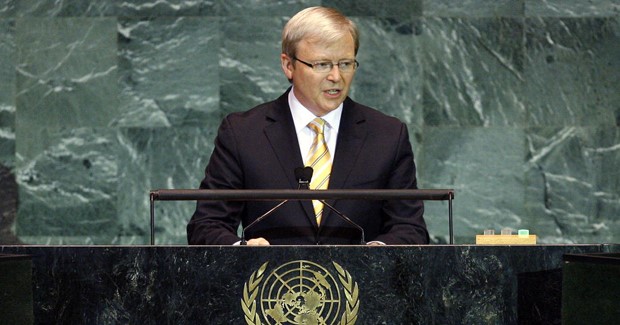My Name is Kevin And I’m Here to Save the World

Kevin Rudd has asked the Australian government to nominate him for United Nations Secretary-General. The former Labor leader’s nomination is fraught with difficulties as those already in the race, including former New Zealand Prime Minister Helen Clark, former UN climate chief Christina Figueres and several candidates from Eastern Europe, make his prospects slim.
Foreign Minister Julie Bishop confirmed on Monday that former Prime Minister Kevin Rudd has asked to be nominated as a candidate to be the next United Nations Secretary-General. Some cabinet ministers are strongly opposed. Immigration Minister Peter Dutton has advised Rudd to take up a retirement hobby like golf. Treasurer Scott Morrison is also believed to be unenthusiastic.
There are three tricky issues for the government. The first is trans-Tasman relations since former Prime Minister Tony Abbott had pledged Australia’s support for Helen Clark’s candidacy. However, should the Turnbull government decide to nominate Rudd, Kiwis will surely understand why an Australian government decided to prioritise support for a former Australian over a former New Zealand prime minister (disclosure: I am a national of both countries).
A more challenging issue is the strong worldwide sentiment that it is time for a female secretary-general. By nominating Rudd, Australia would be crossing that sentiment. This may prove embarrassing when gender equality as a global norm has been strongly promoted by Australia.
The third, most difficult consideration of all is hardline opposition from the government’s political base. Heavy electoral losses, fuelled by the lingering resentment at dumping Abbott and fierce anger at the changes to superannuation policy—aggravated by the PM’s and Treasurer’s failure to grasp the difference between retroactive and retrospective—may deny Bishop and Turnbull the political space to nominate Rudd, personal inclinations notwithstanding.
That would be petty, partisan, a pity and a mistake. One of the strengths of Australian (like British, Canadian and New Zealand) democracy is the tradition of bipartisan support for credible national candidates seeking prestigious international office. Anthony Albanese is correct in saying that for the government not to back an Australian would be “extraordinary”.
Rudd has been canvassing support for his candidacy fairly openly, using the many global platforms he has had since losing the Australian election in 2013. Unlike previous occasions, this year official nomination by one’s own government is a prerequisite for candidacy. As of now there are 12 candidates.
If internal Liberal politics make the decision delicate, the UN’s timeline makes the decision urgent. If Rudd is to be considered at all, the end of July is probably the latest by which to nominate him. The UN Charter requires the secretary-general to be appointed by the general assembly upon the recommendation of the Security Council (Article 97). This year the General Assembly has begun to assert a more active role and organised public sessions where the candidates outline their visions and respond to questions from member states and civil society representatives. Although the key decision will still be made by the Security Council, the added transparency could make it hard to ignore the international community’s wishes.
In the past the regional rotation criterion has trumped all other considerations. Some regions fear that if the criterion is abandoned, they will always lose out on the world’s top diplomatic job. This time it is the turn of the West European and Others Group (WEOG). The Eastern Europeans claim they have never had a secretary-general, so WEOG should be conflated into Eastern Europe. In 2006 the general assembly also added the gender equality criterion. Combining the two, a good female candidate from Eastern Europe would have the inside running.
There are two resulting political challenges. Will an East European candidate favoured by the West be acceptable to Russia and vice versa? Or will cross-vetoes rule them out? And if no satisfactory or compromise Eastern European candidate can be found, will the regional or gender criterion prevail? Within WEOG, the CANZ (Canada, Australia, NZ) and Iberian Peninsula countries can equally legitimately say they have never had an secretary-general either. However, Russia could choose to veto all non-East European candidates.
UNESCO Director-General Irina Bokova, an early frontrunner, satisfies both East European and gender criteria. Clark is a woman candidate from within WEOG. But there is some question about the propriety and political judgment of campaigning for the top job without first resigning from existing UN positions. Ten years ago public unease compelled the one internal (unsuccessful) candidate to resign.
Other credible candidates who meet one of the two criteria include Rudd; Danilo Turk, former president of Slovenia and senior UN official; Antonio Guterres, former Portuguese prime minister and UN high commissioner for refugees; Susanna Malcorra, Argentina’s foreign minister and former UN under-secretary-general; and Costa Rica’s Christiana Figueres, former chief of the UN’s climate change authority.
Rudd is not being overly modest in rating his chances poorly in this crowded field. The only plausible pathway for him is to emerge as an acceptable compromise amidst a deadlock.
The Security Council will conduct its first indicative straw poll on Thursday, using white ballot papers, to gauge the candidates’ level of support in the form of “encouragement” from the 15 security council members. Those receiving only two or three encouragements will likely withdraw. By September-October, after the field has been winnowed, the five permanent members (P5) will be given coloured ballots. Any candidate receiving a coloured discouragement—in effect a veto but without revealing the identity of the vetoing country—withdraws. In 1996 Kofi Annan got one P5 discouragement but his leading opponent received two and withdrew, and in time Annan’s sole P5 opponent, believed to be France, changed vote.
In the subsequent ballots, anyone receiving unanimous encouragement from all security council members is the person recommended to the general assembly and usually appointed by acclamation. If two or more candidates are acceptable to all P5 countries, the Security Council can proceed to formal voting in secret to elect the new secretary-general.
No country likes to run an international campaign doomed to failure. Rudd’s prospects of success are finite but slim. They would be cruelled completely if Canberra refuses to nominate him but would not improve dramatically with formal nomination. A simple compromise for the government might be to nominate Rudd formally but not campaign actively for him. This way, Rudd is enabled to proceed with his campaign; success will attest to his global profile, respect and campaign skills; but failure would not rebound to the government’s discredit.
Ramesh Thakur is professor in the Crawford School of Public Policy, Australian National University and a former United Nations assistant secretary-general. The second edition of his book The United Nations, Peace and Security is to be published by Cambridge University Press later this year. This article is published under a Creative Commons Licence and may be republished with attribution.





